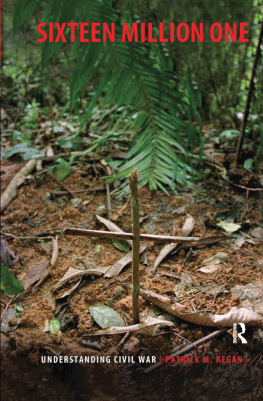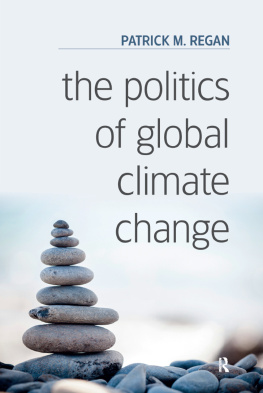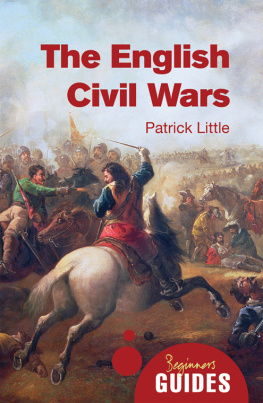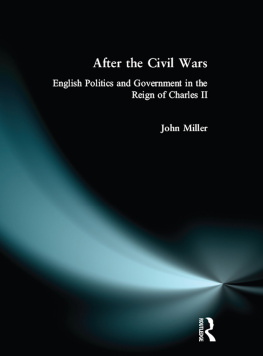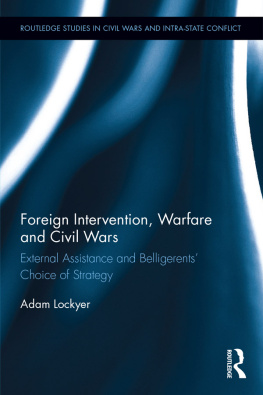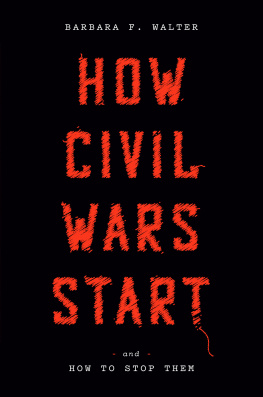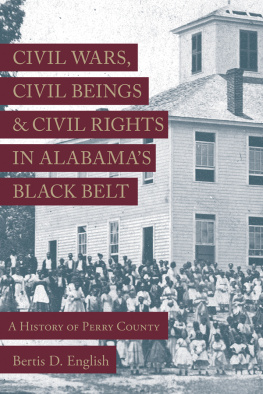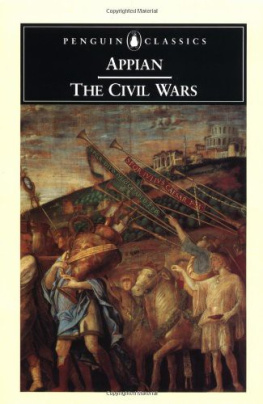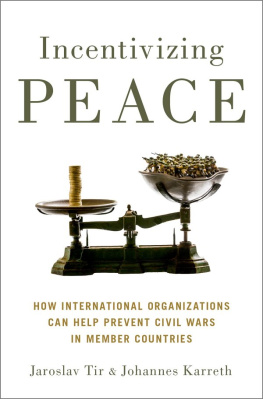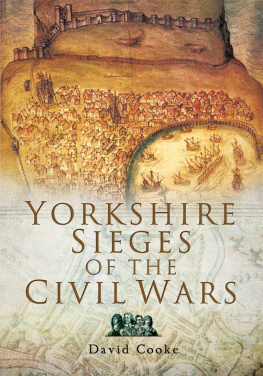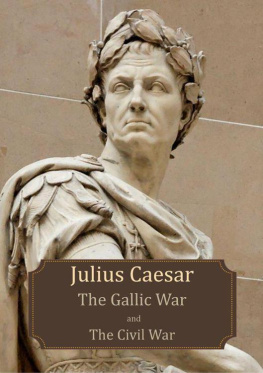First published 2009 by Paradigm Publishers
Published 2016 by Routledge
2 Park Square, Milton Park, Abingdon, Oxon OX14 4RN
711 Third Avenue, New York, NY 10017, USA
Routledge is an imprint of the Taylor & Francis Group, an informa business
Copyright 2009 Taylor & Francis.
All rights reserved. No part of this book may be reprinted or reproduced or utilised in any form or by any electronic, mechanical, or other means, now known or hereafter invented, including photocopying and recording, or in any information storage or retrieval system, without permission in writing from the publishers.
Notice:
Product or corporate names may be trademarks or registered trademarks, and are used only for identification and explanation without intent to infringe.
Library of Congress Cataloging-in-Publication Data
Regan, Patrick M.
Sixteen million one: understanding civil war / Patrick M. Regan.
p. cm. (International studies intensives)
Includes bibliographical references.
ISBN 978-1-59451-619-1 (hardcover: alk. paper)
1. Insurgency. 2. Civil war. I. Title.
JC328.5.R44 2009
303.64dc22
2008027599
ISBN 13 : 978-1-59451-619-1 (hbk)
ISBN 13 : 978-1-59451-620-7 (pbk)
Designed and typeset by Straight Creek Bookmakers.
Many thanks are in order. Binghamton University provided sabbatical time for me to write most of this book; the Fulbright Foundation provided funding for an extended stay in Norway. The Peace Research Institute of Oslo (PRIO) and the Center for the Study of Civil Wars, in particular Scott Gates and Nils Petter Gleditsch, provided a great environment for my stay. The National Science Foundation and the World Bank each provided funding for some of the research that shapes the arguments I present. I thank Bobbie Lord, Celeste Rabaut, Wendy Martinek, Fritz Johnson, and Meg Mitzel, my spouse, for providing commentary along the way, and in Megs case for a good dose of tolerance. Shane and Kaitlin Regan, my children, deserve thanks for imploring me to wear a bulletproof vest on my trip to Palestine, and for not fully accepting my answer that it was neither necessary nor practical. It was one of the ways they showed me that they care. I owe a note of thanks to Will Moore for introducing me to Umi Deshpande, and I owe a huge debt of gratitude to Umi for answering a rather arcane email from a stranger, one that she could have just as easily put in the trash. In the end Umi stuck with me and provided more than most would think wise, read more drafts than anybody would think sane, and taught me more about writing with emotion than I ever thought would be useful. I dedicate this effort to Umi for all she contributed, and to Kaitlin who blurted out one night at the dinner table, What am I supposed to tell my friends? That my dad is going off to be killed by terrorists? Honey, theyre not terrorists, just people with few options who try to make change by force of arms. Unfortunately there are many people in similar predicaments. Maybe someday you can be part of the process that changes the way the world works.
Patrick M. Regan
is the number of people who have died in civil wars in the last fifty years. Give or take a person.
E very generation has its civil war. Mine was Cambodia, 1978. This war accounts for at least a million of those sixteen by some estimates. The famine that ensued in the wars aftermath took its own toll, starving the displaced millions that had survived the killing fields of the Angkar. The American Red Cross, the UN, the world community began to respond to the humanitarian crisis that was developing. I was in my first year of college, studying to be an airline pilot. But Cambodia happened, and I wanted to be there. I wanted to help in some way. The relief agencies needed truck drivers, and I had just quit driving a truck to go to college. I hitchhiked to Detroit to meet my father, to tell him my intentions. We sat in a diner drinking endless refills of the same cup of coffee, and I attempted to convince him that it was imperative I go to Cambodia. He listened, as fathers do. But he cautioned me to stay in college. There will be other wars for you, and other famines. He was right, as fathers are. Although I could hardly stomach the idea then, of other wars and other famines, of millions starving and dead, there have been, of course, other wars and other famines. Many other wars and many other famines. What my father said came not from callousness, as I had then imagined, but from knowing what I now know. That civil wars happen, that famines follow them, that we have not learned how to stop, or manage, let alone prevent civil wars. And so, every generation has its civil war. Or two or three. The Rwandan and Sudanese wars have killed about a million people each, Uganda a quarter of a million, Bosnia two hundred thousand, Indonesia three hundred thousand, the Philippines between fifty and sixty thousand. Cambodia, Yugoslavia, and today, Iraq. And there are those that go on unrelenting, sometimes silent, sometimes boiling, simmering through generation after generationNorthern Ireland, Sri Lanka, Kashmir, Palestine.
In hindsight, and with a decade of research behind me, it is clear to me that civil wars are neither isolated nor unique events. There have been, in the last fifty years, on average twenty civil wars ongoing in each year. The lands, the people, the very spirit of the countries they are fought in are left ruined, exhausted, unable to resurrect themselves for generations, and some have slipped back into war again and again. In 1978 I did not want to face the reality that these events would outlast me, and I have been puzzled ever since about why wars happen and what we can do to prevent them. They seem like such an outmoded means of settling disagreements, and yet even the wisest, the wealthiest, and the most informed appear to walk willingly into the carnage in pursuit of some outcome that could be achieved without sacrificing the lives of so many people. Over the years Ive found that there are no easy answers, nor are there easy solutions. I have become convinced, however, that wars are neither necessary nor inevitable. Civil wars may be the most perplexing of all wars to comprehend, and yet, they are most influenced by attempts to control them. Commonplace and as devastating as they are, though, civil wars are little understood by the public, by the media, even by the very policy makers who make a difference in the outcomes of these wars. Just look at the debate about whether Iraq is or is not in a civil war. Thousands of people die each month because organized and armed groups are fighting over control, and we cannot come to grips with whether or not we should call this a civil war. If the implications were not so important we wouldnt be discussing the issue on the cable news, nor would it have been an election issue.
It is only by understanding the causes of civil wars that policy makers can design effective ways to control them. We can talk about anticipating genocides, eliminating dictators, preventive interventions, and eradicating poverty, but unless there is a clear grasp of how and why these issues arise, coherent policies cannot be developed. It is the broad publicyou and Iwho has to bear the burden of the outcomes, and we need, therefore, to have clear ideas about the causes and the implications.

